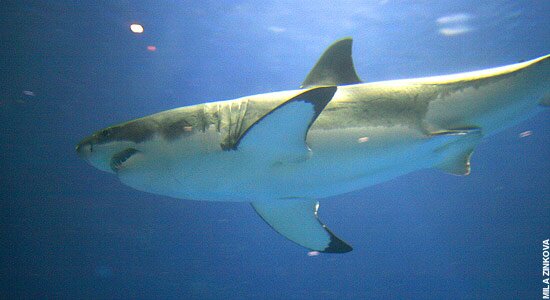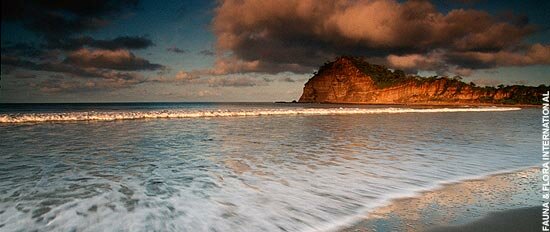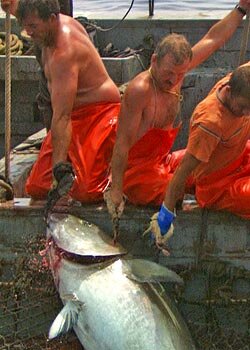While reviewing the coverage that The End of the Line has received over the past months we came across a number of articles and stories that we hadn’t included in our weekly news round-ups.
To put this right, we have pulled together all the articles that slipped through the net, below.
You can see what the media and the blogosphere have had to say about The End of the Line on our new Media Coverage page.
Back in May Endangered New Jersey blog carried a preview of the film. It said: “The film aims to be more than just a doomsday warning. It offers real, practical solutions that are simple and do-able.”
Total Film reviewed the movie, giving it 3 stars. Jamie Russell said: “[Rupert] Murray, working from Brit journo Charles Clover’s book, accentuates the positive with a closing ‘get involved’ sermon about our eating habits.”
Writing in The Independent in an article on bluefin tuna entitled ‘This is the blue whale of our time‘, Charles Clover said: “The collapse of the bluefin now being predicted is a crisis of Atlantic proportions.”
Also in The Independent Martin Hickman reported on Mitsubishi’s efforts to stockpile bluefin tuna.
The Gazette, a regional paper covering Colchester in Essex, focused on the need for change in fishing legislation.
While an article in The Japan Times showed the reach that the film has had. William Hollingsworth highlighted the contradictions in Nobu’s bluefin tuna policy.
One that we should not have missed was Nobu -no brainer, by our very own Willie MacKenzie of Greenpeace UK, who has been doing tremendous work for The End of the Line.
Caterer Search reported on the efforts by restaurant owner Tom Aikins, who teamed up with the campaign, to change the way professional chefs think about seafood.
He said: “All chefs need to understand where their fish comes from, help with traceability of any fish products, make sure they are not serving endangered species”
The New York Post focused on the storm caused by the film about Nobu, especially the response of celebrities such as Kate Goldsmith and Sienna Miller.
The RSPB, understandably, concentrated on the damage that longline fishing does to seabirds, in its preview of the film.
The Daily Mail covered the move by Pret a Manger to stop using unsustainable tuna.
As did The Sunday Times.
The Hampshire Chronicle carried a lengthy preview of the film, featuring quotes from The End of the Line producer Claire Lewis. She said: “I read Charles Clover’s book and it changed my view of the ocean overnight. I rang him and the rest is history.”
On World Ocean’s Day, the Telegraph ran a preview of the film. As did The Guardian, who also focused on Pret a Manger’s move away from unsustainable seafood.
Greenpeace’s Willie Mackenzie continued to publicise the film, outlining the campaign’s activities in the run up to World Ocean’s Day.
Birdlife International said of the release of the film: “Today, on World Oceans Day, a powerful new film - The End of the Line - highlights the problems of over-fishing.”
In The Times, Ocean’s Correspondent Frank Pope, wrote: “Explanations do not get much more powerful than the film The End of the Line, which looks at the effect of overfishing, and which is being shown today, World Oceans Day, at cinemas nationwide.”
Environment news site Ecorazzi focused their attention on the celebrity response to Nobu’s decision to keep bluefin tuna on the menu.
The celebrity party after the 8th June screenings featured in the London Evening Standard.
Sam Leith, writing in the London Evening Standard, hailed Charles Clover as a ‘hero’. However, it is because of Sam’s love of eating tuna that he is concerned about it’s possible extinction.
The BBC explored a number of the issues that are raised in the film, especially the threat to bluefin tuna. Stephen Dowling quotes Charles Clover as saying: “Bluefin tuna has become the poster boy for the overfishing campaign. It’s on the buffers - it’s really on the slide down now.”
Daniel Kessler of Greenpeace, writing in the Huffington Post, praised the film: “Nobu’s arrogant denial of the reality of our mutual challenge - the continual decline of the health of our oceans - is a serious problem.”
He went on to say: “Greenpeace has already “outed” Nobu on their unsustainable practices (this interaction is featured in the forthcoming documentary The End of the Line, based on the excellent book by Charles Clover).”
Another Greenpeace blogger, Adele, was also very impressed, saying: “I was at the [UK] premiere screening of the film (a documentary based on the book by journalist Charles Clover) here in London, and boy, it took me back. It was like Defending Our Oceans: The Movie.”
Financial news organisation Bloomberg concentrated on the Pret a Manger’s assertion that prices will not go up after their move to sustainable tuna.
Writing in Newsweek, Daniel Stone said: “At current capacity, the world’s fishing fleet could catch four times more fish each year than are actually alive in the oceans.
“This sad fact is the central point of a new documentary released today, End of The Line, an astute, powerful and discomforting look at what we’ve done to the world’s oceans.”
Sylvia Patterson, writing in the Sunday Herald, said that for her, “a world without fish is a world where there’s nowt for tea.”
“The End of the Line has arrived all round, as the just-released film globally acknowledged to be the Inconvenient Truth of the oceans thunders home its staggering facts about ‘the greatest environmental disaster that no-one’s heard of’.”
The London Paper reported on the reasons behind Pret a Manager’s change in tuna sourcing policy: “Metcalfe changed the store’s policy on tuna after seeing The End of the Line, the shocking documentary on the global fishing business.
“He saw the film five months ago and was so disturbed, he arranged a private viewing for 40 of the company’s senior managers at a private cinema in London four days later. ‘I felt I had a responsibility,’ he says. ‘Knowledge is power’.”
The Big Issue in Scotland reported the angry reaction to the film from Scottish fishermen, who said it was “excessively gloomy and over-simplistic”.
![]()





